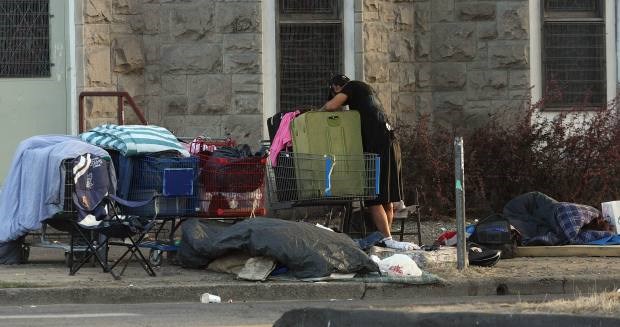People who live near Kings Park in Fernwood are unhappy that the park is being used as a campground by homeless people. They have every right to be upset — camping where camping was not intended can degrade a park and hamper the ability of others to enjoy green spaces and fresh air.
That doesn’t mean the answer is to simply kick the campers out of the park. Homelessness is a problem that requires compassionate and intelligent solutions, but city parks should not be the default solution. Urban parks are not designed or intended to shelter the homeless. As one person told Times Colonist reporter Sarah Petrescu, Kings Park was not meant to accommodate a tent city. It has no washroom facilities, which poses potential sanitation problems.
It’s a perennial problem for Victoria and other municipalities. In 2008, the B.C. Supreme Court struck down a Victoria bylaw aimed at preventing homeless people from setting up tents and sleeping in city parks. The court ruled the bylaw deprived the homeless of life, liberty and security in violation of the Charter of Rights and Freedoms.
The city first appealed the decision and then amended the bylaw to restrict the camping to between 7 p.m. and 7 a.m. Homeless advocate David Johnston tried to challenge the new bylaw in both the B.C. Supreme Court and the B.C. Court of Appeal, but was unsuccessful.
That still leaves people free to set up camp in parks for the night, provided they take down their tents in the morning. What is often left out of the equation is the other part of the court ruling: Homeless people should be allowed to set up temporary shelters in Victoria’s green spaces when shelter beds were not available.
But shelters are not always pleasant places. Some of the campers said they fear bedbugs, being robbed and encountering unsavoury people.
Besides, people are sleeping in parks because the shelters are almost always full, say outreach workers.
And a mat on a floor is still a temporary solution. People are turned out in the morning to live on the streets.
The solution to helping the homeless is fairly straightforward — give them a home.
A 2012 study by Stephen Gaetz, director of the Canadian Homelessness Research Network, which pulls together research from across Canada and the United States, suggests it’s far cheaper to give a homeless person a place to live than to provide a patchwork of emergency services.
A Central Florida Commission on Homelessness study showed that the region spends $31,000 a year per homeless person on “the salaries of law-enforcement officers to arrest and transport homeless individuals — largely for non-violent offences such as trespassing, public intoxication or sleeping in parks — as well as the cost of jail stays, emergency-room visits and hospitalization for medical and psychiatric issues.”
On the other hand, getting each homeless person a home and a caseworker to supervise their needs would cost about $10,000 per person.
Study after study has shown that housing the homeless, besides being compassionate, is a money-saving venture. Mental-health issues are more easily treated; having a permanent home vastly improves employment prospects. Medical, judicial and other costs are vastly reduced.
The B.C. Supreme Court ruling protects the right of the homeless to sleep in parks, so neighbours’ complaints notwithstanding, they will continue to do so. But it’s not a good permanent arrangement for the parks or the people sleeping in them.
Both would be better served if these people had places they could call home.



